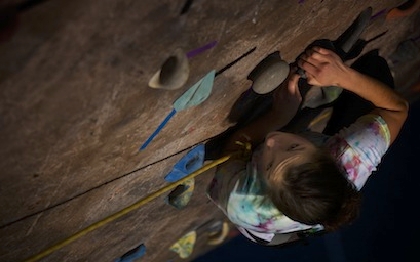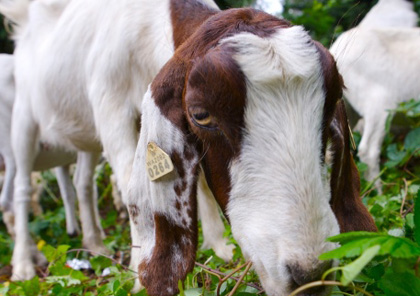Page 13 • (286 results in 0.018 seconds)
-

Textile artifacts from the Scandinavian Cultural Center (SCC) will be on display in the University Gallery exhibition entitled “Common Threads: An Overview of Scandinavian Textiles” February 3 – March 2, with an opening reception Wednesday, February 10, 5pm-7pm. The presentation of textile pieces will include…
aspects are easily seen in their regional costumes, dignitary and everyday wear.” The gallery will be full of color and texture. Several examples of textile techniques will be shown, as well as pieces from the distant past and present. “[My favorites are] some of the ‘heavily used’ rugs that show wear and tear,” Caspersen remarks. “When an item was used until it was almost in shreds, it means to me that they were not a throw-away society and items were meant to last.” In addition to the University
-

Something I Thought I’d Never Do: I never thought I’d become a rock climber Stretched out against a mock rock face at Tacoma’s Edgeworks Climbing Indoor Rock Gym, Kristi Reidel ’09 considered her next foothold, as she step-by-step scaled a 30-foot vertical wall with routes…
mountaineering course. That Reidel had never done this before didn’t matter. She wanted to challenge herself. The basic mountaineering class, taught by university fellow and archeologist Don Ryan, familiarized students with knots and carabineers, climbing techniques and how to survive in the wild. He uses these skills while shimmying up and down ropes into Egyptian tombs on his research trips. The half-semester class included an overnight trip nearby into the Cascade Mountains to test skills outside the gym
-
The University of Washington Molecular Engineering Materials Center (UW MEM·C) summer REU program is focused on exposing underrepresented minorities and veterans to a viable and relevant career pathway focused on materials and energy research. OUR FOCUS: MATERIALS RESILIENCE AND INNOVATION Undergraduates, including veterans, will find…
a graduate student and faculty to develop a research project, gain training in relevant techniques and instrumentation, collect data, and finally produce a poster and research abstract. Students participate in a weekly seminar on undergraduate research covering research ethics, writing a research abstract, making a scientific poster. Students participate in a weekly Materials Science special interest group in which they read scientific journals or tour other labs. Duration: 9 weeks Dates: June
-
Summer Health Professions Education Program (SHPEP) Are you interested in pursuing a career in medicine, dentistry, or public health? If so, please consider applying to the SHPEP at the University of Washington. SHPEP is a free six–week academic enrichment program with a goal of increasing…
explorations of their identity, culture, and strengths, and how to weave these into an individualized education plan. Participants have many opportunities to meet healthcare providers and researchers whose work addresses reducing health disparities. SHPEP at the University of Washington utilizes a range of teaching styles including lecture, active learning techniques, discussion groups, self-reflection and virtual hands-on activities to increase student engagement and learning. This year the program will
-
TACOMA, WASH. (March 21, 2016)- MediaLab, the applied research and media production program at Pacific Lutheran University, has received a prestigious national award for its most recent documentary film. These Four Years, which premiered in Seattle in November 2015, has earned a Grand Prize in…
of the West Director Richard Nance discusses his recent leadership award and the origins of “St. Matthew Passion” Read Next Teachers tinker: Education department’s annual Benson Lecture, hands-on workshop bring spirit of maker movement to PLU COMMENTS*Note: All comments are moderated If the comments don't appear for you, you might have ad blocker enabled or are currently browsing in a "private" window. LATEST POSTS Caitlyn Babcock ’25 wins first place in 2024 Angela Meade Vocal Competition
-
The Summer Undergraduate Research Fellowship (SURF) Program at UT Southwestern’s Graduate School of Biomedical Sciences is an intensive summer research training experience designed for college students who are preparing for Ph.D. or M.D./Ph.D. careers in biomedical research. Fellows spend 10 weeks (beginning in early June and…
research projects in the laboratories of Graduate School faculty members. Fellows gain experience in modern research techniques and plan and execute an experimental strategy to answer a scientific question. SURF introduces students to the kinds of projects encountered during postgraduate research training and fosters an understanding of the planning, discipline, and teamwork involved in the pursuit of answers to current questions in the biological sciences. At the end of the SURF Program, fellows
-

The success of MediaLab has given students an opportunity to gain valuable skills in a real-world setting. It’s been a goldmine of experience, leading students to internships and jobs and winning them an Emmy and multiple nominations. In addition to faculty and university support, outside…
helped make the program what it is today. The Tacoma News Tribune was the first, and longest-running community partnership in MediaLab’s 10 years of existence. They have agreed to continue their financial support through January 2018. Donations in the early years provided seed money that allowed MediaLab to purchase video cameras and editing software. MediaLab’s early work appeared on the Tribune website, and gave students the opportunities to develop shooting techniques. “The partnership with The
-
The Summer Undergraduate Research Fellowship (SURF) Program at UT Southwestern’s Graduate School of Biomedical Sciences is an intensive summer research training experience designed for college students who are preparing for Ph.D. or M.D./Ph.D. careers in biomedical research. Fellows spend 10 weeks (beginning in early June and…
research projects in the laboratories of Graduate School faculty members. Fellows gain experience in modern research techniques and plan and execute an experimental strategy to answer a scientific question. SURF introduces students to the kinds of projects encountered during postgraduate research training and fosters an understanding of the planning, discipline, and teamwork involved in the pursuit of answers to current questions in the biological sciences. At the end of the SURF Program, fellows
-

Cassio Vianna has been a teacher since he was 8 years old. At that time, his mother was learning to play the organ and Vianna decided to go with her to her lessons rather than stay at home with his siblings. “To this day, my…
. “His rehearsal style is a perfect balance of cutting edge pedagogy and inventive setup, sequencing, and scheduling,” Galante says. “His compositions are tailor-made for the Jazz Ensemble and he, seemingly effortlessly, showcases the strengths of the group.” And while Vianna enjoys the accolades his work has earned him, and the challenges it presents, his true passion is to help others. His mother, who learned to play the organ to fill a need for a musician at her church, told him music can do just
-

Food Symposium addresses the many ways food impacts the world. The ethics of food By Katie Scaff ’13 The PLU Philosophy Department’s Food Symposium Feb. 21 will address the ethics revolving around food. Keynote speaker, Paul B. Thompson – the W.K. Kellogg Chair in Agricultural,…
key problems in food ethics: the ethics of global hunger; the ethics of food consumption as it relates to personal and public health; and the ethical underpinnings of “the food movement” and its attraction to local and ethically motivated supply chains. Paul B. Thompson – the W.K. Kellogg Chair in Agricultural, Food and Community Ethics will speak at 7 p.m., Feb. 21 in the UC Regency Room. “He’s worked with the industry side of farming, and is interested in issues of sustainability and often has
Do you have any feedback for us? If so, feel free to use our Feedback Form.


